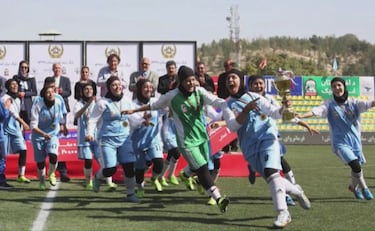Khalida Popal on the impact of the Taliban takeover on women’s football in Afghanistan
The former Afghanistan women’s soccer team captain spoke at WFS about using her voice to raise awareness of the situation of women in the country.

“We need to understand what our power is, and how we can use it. My power is my voice. I have to find the drive to continue fighting for my girls,” says Khalida Popal. The former Afghanistan women’s team captain (Kabul, 1987) spoke at the World Football Summit in Madrid on Thursday 23 September. She encourages her audience to continue fighting for “voiceless women” through using their platforms and own voices.
Popal was the first woman to ever join the board of the Afghanistan Football Federation. She also became a leader of women's football in Afghanistan, and created more job opportunities for other women to join. Showing a photo of the Federation soon after she joined, Popal said, “Amongst all those beautiful men, there’s me standing alone. A woman in the Afghanistan Football Federation. It was really difficult and I was the youngest. I had to really work hard to prove myself. I worked three times harder than my male colleagues to show that I'm comfortable and I have the ability to work in the football federation.
Popal receives death threats
The development of women's football In Afghanistan led by Popal was highly successful, with players taking part first in the capital Kabul and then moving out to the less developed regions of the country. However her activism resulted in her having to flee the country in 2012. “I had to leave my country overnight because it was a great threat to my life and my family,” she said. Popal managed to achieve asylum in Denmark, where she now lives, and has used football and media as tools to “empower women and girls.”

Showing a photo of some of the players celebrating, Popal explains: “They're 16 or 17 years old. All they want to do play football.” The team in the photo, says Popal, are a team “of champions” from one of the provinces of Afghanistan and who had won the league. “What they were saying in this photo was, ‘we have wings and we can fly’”. For Popal, competing in sport is about more than just the physical activity, it is “changing the mindset”, both of the women taking part, and of, potentially, the whole of society.
“I founded my organization “Girl Power”, where we use the capacity of education and sports to include women from all cultures and backgrounds”. She became more involved than when she was living in Afghanistan and the future for both her and women's football in Afghanistan was looking bright. According to Popal, mentoring and supporting women from outside Afghanistan was “so much better”, as she was better able to develop the right resources to help them.
A "breaking moment" for women's football in Afghanistan
In 2018, Popal and the rest of the Afghanistan women’s football organization witnessed what Popal called a “breaking moment”. As she explains, “Some of the female players were suffering from sexual abuse by the former President of Afghanistan Football Federation [Keramuudin Karim]. The women’s football team went from preparing for the World Cup qualification to fighting for the rights of those abused players. It was not an easy fight, but we got this man banned for life from football, all activities, and he also got fined,” said Popal.
Keramuudin Karim was fined 1 million Swiss Francs by the Fifa ethics committee for breaching its code after players came forward to the Guardian in November 2018 to expose sexual, physical and emotional abuses of members of the Afghanistan Women’s team. At the time Popal said, “I am glad that the voices of so many young innocent players finally have been heard. This is a great start and a strong statement that there is no room for abuse and violence in football.” Karim appealed the fine, which was upheld by the Court of Arbitration for Sport.
FIFPro reaches out to Popal after Taliban takeover
Following the recent events of the Taliban taking over Afghanistan in August after the US pulled out, Popal spoke about what has been happening since. “It was a nightmare because it was traumatising for me. My childhood was repeating again.”
Popal started reaching out to her friends, and using the media to share their story. She explained that she was receiving voice messages from the players in Afghanistan: “What I received was the voice messages of young girls, desperately crying and seeking for hope for protection. And they were crying about what had happened, [saying] why are we being punished? Why we are being abandoned? Can we play football again? Will we even be allowed to go and watch football. Can we walk again on the football pitch? And I was sitting with all those messages, thinking about the dreams, the talks, and all the players with the passion that they wanted to play for their country. And now the right of playing football has been taken from them. And I didn't know how to help them.”
The situation changed when FIFPro, the worldwide representative organisation for 65,000 professional footballers, reached out to her. “ It was not FIFA, unfortunately. It was FIFPro, and we are not part of the Pro. But they stood up for us. They came forward and said how can we help. And I said, 'I have no idea how you can help, because you're a Football Association, but our girls are stuck there. And we need a plan to get them out.'"
Popal and the team of supporters worked “day and night” to find a way to evacuate the players, what she calls the “generation of dreamers”.
“One day before the suicide explosion [at the airport in Kabul] we managed to get the girls out.” I just kept reminding my girls to fight. I told them that it’s okay if the Talibans beat you. Just get to the airport. We will be together as a team.” And they managed it, in total some 380 players and people connected to women's football in Afghanistan were evacuated.
Related stories
The first team is now safe in Australia. They have left their families behind.
